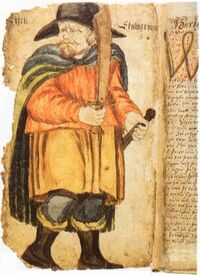
An illustration of Egill Skallagrímsson, hero of the famous Egils saga.
The Sagas of Icelanders (Íslendingasögur) are works of prose literature that detail the lives of those living in Iceland during the "Saga Age" of the 10th and 11th centuries. In contrast to other sagas, they typically are about non-noble (albeit upper-class) people and are largely historical or genealogical in focus, although fantastic or mythological elements do feature on occasion.
The majority of Icelandic sagas were written in the 13th and 14th centuries in Iceland, and their authorship, with the possible exception of Egils saga, is entirely unknown.
Historical Background[]
The Icelandic sagas are set during the Saga Age, a period loosely defined as the two centuries surround Iceland's conversion to Christianity. The sagas themselves were written in the 13th and 14th centuries, between the tumultuous Sturlung Era and the Kalmar Union which brought Iceland under Danish-Norwegian dominion. As such, they are sometimes seen as a nostalgic remembrance of a more independent era.
The topic of the historical veracity of sagas is in frequent debate. In the 19th century, the tendency was for scholars to regard the sagas as accurate historical accounts passed down through oral tradition until transcribed later. Recently, the discovery of a multitude of inconsistencies between individual sagas and between the sagas and the historical record, as well as a re-analysis of their more fantastic elements, has led many modern scholars to regard the Icelandic sagas more as literary creations than as historical accounts, although there are still proponents of the latter view.
Complete List[]
- The Saga of the Confederates (Bandamanna saga)
- The Saga of Bárð Snæfell-Spirit (Bárðar saga snæfellsáss)
- The Saga of Bjorn Hítdæla-Warrior (Bjarnar saga hítdælakappa)
- The Saga of Burnt Njál (Brennu-Njáls saga)
- Droplaugarson's Saga (Droplaugarsona saga)
- The Saga of Egil Skallagrímsson (Egils saga Skalla-Grímssonar)
- The Saga of Eirik the Red (Eiríks saga rauða)
- The Saga of the Spit-dwellers (Eyrbyggja saga)
- The Saga of the Faroe Islanders (Færeyinga saga)
- The Saga of Finnbogi the Strong (Finnboga saga ramma)
- Fljótsdæla saga
- The Saga of the Men of Flói (Flóamanna saga)
- The Saga of the Sworn Brothers (Fóstbræðra saga)
- Gísli Súrsson's Saga (Gísla saga Súrssonar)
- Saga of the Greenlanders (Grænlendinga saga)
- Gretti's Saga (Grettis saga)
- Gold-Þórir's Saga (Gull-Þóris saga)
- The Saga of Gunnar the Fool of Keldugnúp (Gunnars saga Keldugnúpsfífls)
- The Saga of Gunnlaug Serpent-Tongue (Gunnlaugs saga ormstungu)
- Hen-Þórir's Saga (Hænsna-Þóris saga)
- Hallfreð the Troublesome Skald's Saga (Hallfreðar saga vandræðaskálds)
- The Saga of Harð and the People of Hólm (Harðar saga og Hólmverja)
- The Saga of Hávarð of Ísfirð (Hávarðar saga Ísfirðings)
- The Saga of the Heath-Slayings (Heiðarvíga saga)
- The Saga of Hrafnkel Frey's Goði (Hrafnkels saga freysgoða)
- Hrani Ring's Saga (Hrana saga hrings)
- Saga of the People of Kjalarnes (Kjalnesinga saga)
- Kormák's Saga (Kormáks saga)
- The Saga of Ref the Sly (Króka-Refs saga)
- Laxdæla saga
- The Saga of the People of Ljósavatn (Ljósvetninga saga)
- Ölkofri's Saga (Ölkofra saga)
- The Saga of Reykdæl and Killer-Skútu (Reykdæla saga og Víga-Skútu)
- Svarfdæla saga
- The Saga of Þórð Menace (Þórðar saga hreðu)
- The Saga of Þhorstein the White (Þorsteins saga hvíta)
- Þorstein Síðu-Hallsson's Saga (Þorsteins saga Síðu-Hallssonar)
- Valla-Ljót's Saga (Valla-Ljóts saga)
- Vatnsdæla saga
- Killer-Glúm's Saga (Víga-Glúms saga)
- Viglund's Saga (Víglundar saga)
- The Saga of the People of Vopnafirð (Vopnfirðinga saga)